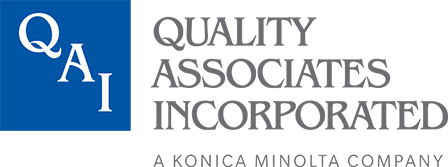By Susan Kim, STAFF WRITER
A Fulton-based company is helping county workers shake off their stereotypical paper-pusher image. Quality Associates Incorporated (QAI) has worked to provide Howard and Anne Arundel counties – among many others – with sophisticated ways to digitally store and retrieve documents. Before QAI entered the scene, gaining access to records from any county department was often difficult and time consuming, explained Scott Swidersky, director of QAI’s information systems division. So Swidersky and his team structured a digital solution that helps county employees from all departments quickly find what they need. “We looked at how we could enable departments, like the police department, to have access to records that were created in hard copies. We looked at how departments could have simultaneous access to documents.” Counties tend to work with independent silos of information, Swidersky found. “There are so many independent decisions and independent records that it became very difficult to share information.” Employees found themselves filling out “request for information” forms, then waiting – often several days – for a document. Not anymore, said Swidersky. “Now that there is a standardized digital archival and retrieval solution, that police report is scanned, posted to an application and easily tracked and retrieved.”
Family-Owned Business
Swidersky’s father founded QAI in 1986 as a scientific consulting firm that addressed the regulatory space for companies trying to get pesticide products approved by the Environmental Protection Agency. “This is a very heavily regulated environment,” said Swidersky. QAI began serving as an independent reviewer for organizations trying to make sure they got their products approved. In that line of business, the QAI team first began seeing the value of effectively managing paperwork. “These kinds of companies are extremely document intensive,” said Swidersky. Swidersky always knew he wanted to work with his father’s business. “I went to college for environmental science and marine biology,” he said. But when Swidersky emerged from his studies, he found that environmental consulting was not what he enjoyed. “I had a decision to make,” he recalled. “I had to find a new job or develop a new division.” The company’s information systems division was born, and Swidersky hasn’t looked back since. He believes he’s making a difference, not just in document storage, but in the everyday working lives of people. For example, employees at the county level once faced a cumbersome review process for certain hard-copy documents. “A lot of the approval processes once involved paper,” he said. “Today they don’t do that. They go to their computers. They had piles and piles of papers. But now, if you can imagine, they have a digital dashboard. They can see every single reviewer and determine where things are in the process.”
Looking at the Big Picture
Though QAI helps local county workers, the firm also courts larger clients. “Seventy percent of our client base is within the federal government,” said Swidersky. “Our largest client is NIH [National Institutes of Health], and also the FDA [Food and Drug Administration] and Centers for Disease Control.” In a local area where many companies work for government entities, Swidersky believes QAI is different. “The first thing that we do is, when we’re aware there’s a problem, we spend time doing an analysis of the problem. What we do as a company is, we spend the time on the front end to understand what the client wants to do. We’re solution providers, not vendors.” In the course of serving its customers, QAI provides customized software, conversion services and solutions that support knowledge and content management. QAI’s offerings include software applications, hardware and systems for scanning and imaging; services for document conversion and materials conversion; storage and electronic archiving; systems integration, support and training; and strategic consulting for quality assurance.
Digitizing the Future
Swidersky joins many contemporary technology thinkers in envisioning a paperless society. “I think that’s what a lot of companies are striving for,” he said. Though that reality is not reachable right now, companies can certainly manage their documents more efficiently, and ultimately, accomplish more with fewer people. In these uncertain economic times, more and more businesses are searching for ways to streamline their day-to-day operations and ease the burden on understaffed departments. Swidersky believes that’s why companies have continued to steadily approach QAI. “We’ve not really seen a downturn in the amount of work we’re finding,” he said. In addition, QAI’s steady federal clients have helped buffer the firm from recession. “Although a lot of federal agencies are not getting increases in budgets, they have not had to cut our services,” he said. Still, Swidersky is keeping a watchful eye on the current economy, particularly on the potential demise of industry giants such as Chrysler Financial Corporation and Ford Motor Company. “They had better be looking to utilize digital technology to improve their current work flow processes,” he said. “Otherwise, how do we deal with this downsizing? Companies are going to have to look for better ways to do things.”

